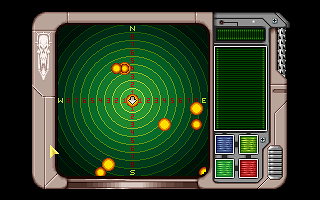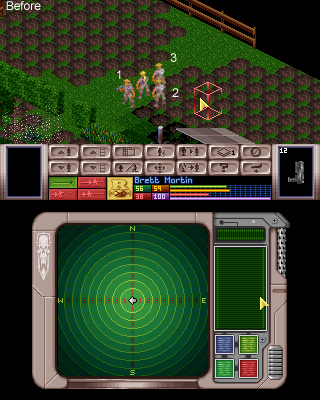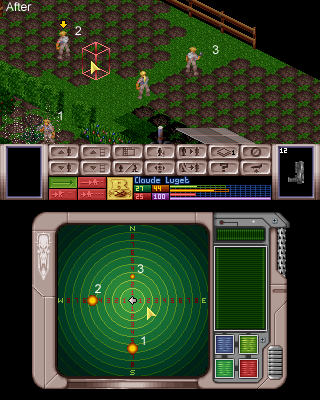Difference between revisions of "Motion Scanner"
m (→Hints and tips) |
m (→See Also) |
||
| Line 42: | Line 42: | ||
* If [[Flying Suit]]s are available, a soldier can land on the roof of a building or UFO and use the scanner to watch for movement. | * If [[Flying Suit]]s are available, a soldier can land on the roof of a building or UFO and use the scanner to watch for movement. | ||
| − | == See | + | == See also == |
*[[DETBLOB.DAT]] | *[[DETBLOB.DAT]] | ||
*[[Data Canister: Motion Scanner]] | *[[Data Canister: Motion Scanner]] | ||
| − | |||
{{Equipment (UFO Defense) Navbar}} | {{Equipment (UFO Defense) Navbar}} | ||
[[Category:Equipment (EU)]] | [[Category:Equipment (EU)]] | ||
[[Category:Research (EU)]] | [[Category:Research (EU)]] | ||
Revision as of 14:28, 14 February 2012
This sophisticated device uses a variety of detectors and advanced computer algorithms to identify moving enemy units. However, it requires some practice to use effectively.
This item appears in UFO: Enemy Unknown. For the Terror from the Deep equivalent, refer to the Particle Disturbance Sensor.
Stats
|
Use
Click on the motion scanner icon on the tactical display. Select 'Use Scanner' from the menu. The Scanner display shows an arrow in the centre which is the direction the soldier is facing (North is at the top). The flashing blobs show units which have moved recently. The main use is to check for movement of units in an enclosed area - i.e. the UFO or a building or even the outside of the Skyranger before you embark after waiting the first or more turn.
The orientation is simple. It's the same as the overhead map. Top is North, then clockwise it's East, South and West. The numbers on the rings on the screen represent every tile away from you. It goes up to 8 or 9 rings, so that's a 9 tile radius. Which is coincidentally your visual range at night, so there's absolutely no point in using a motion scanner out in the open.
Using soldiers as an example, when no movement has occured, you'll get nothing on the screen.
After movement, units that have moved will register on the display. Note that the more they have to walk, the larger their blip on the screen.
That's it really. It's useful if you've got a wall and cannot see what's behind it. Out in the open, it's useless. The further a unit has moved, the larger a blob it will produce. Large units produce bigger blobs with less movement. Sectoids produce smaller blobs then any other unit.
Tips
- Motion scanners will only pick up units that moved. Enemies lying in ambush will be invisible.
- The motion scanner has a very short range, making it useless in open terrain: you will be in a firefight long before anything shows up on the scanner.
- It is most useful during UFO assaults and recoveries; park a trooper beside the UFO to see where the aliens are inside.
- The scanners is useful when disembarking from the transport after waiting at least one turn.
- Use the motion scanner at the beginning of your turn, before any friendly units have moved apart from the scanner operator. This will reduce confusing "clutter" on the screen, caused by the movement of friendly units.
- Although the scanner is calibrated radially, in rings, it is also possible to read grid coordinates off the scanner. This helps greatly in exactly pinpointing enemy blips (and eliminating friendly blips). If you project at right angles from the horizontal and vertical red range indicators, to the blip, you can determine that it is e.g. "3 ahead, 5 left".
- For complicated or critical situations, it may help to sketch the scan result on paper (or graph paper). Once you dismiss the scan screen, you need to expend TUs again in order to see the scan (even if nothing has changed and no one has moved). So if you can't keep the key information in your short term memory, write it down.
- Since you can learn the exact positions of unseen enemies, you can attack their positions with grenades or other explosives, even though you have no line of sight. You will need to listen for the death cry of the alien to know if and when you have killed it.
- Or, you can attack towards their position with direct fire weapons, destroying the intervening cover and hopefully revealing the enemy into line of sight, to permit an aimed attack.
- In multi-story buildings and UFOs, soldiers on the ground level can use the scanner to check the upper levels for movement before moving any soldiers upstairs.
- In base defense, soldiers hiding in the upper levels of modules near the access lift and hangars can be used to watch alien movement into the base.
- If Flying Suits are available, a soldier can land on the roof of a building or UFO and use the scanner to watch for movement.



